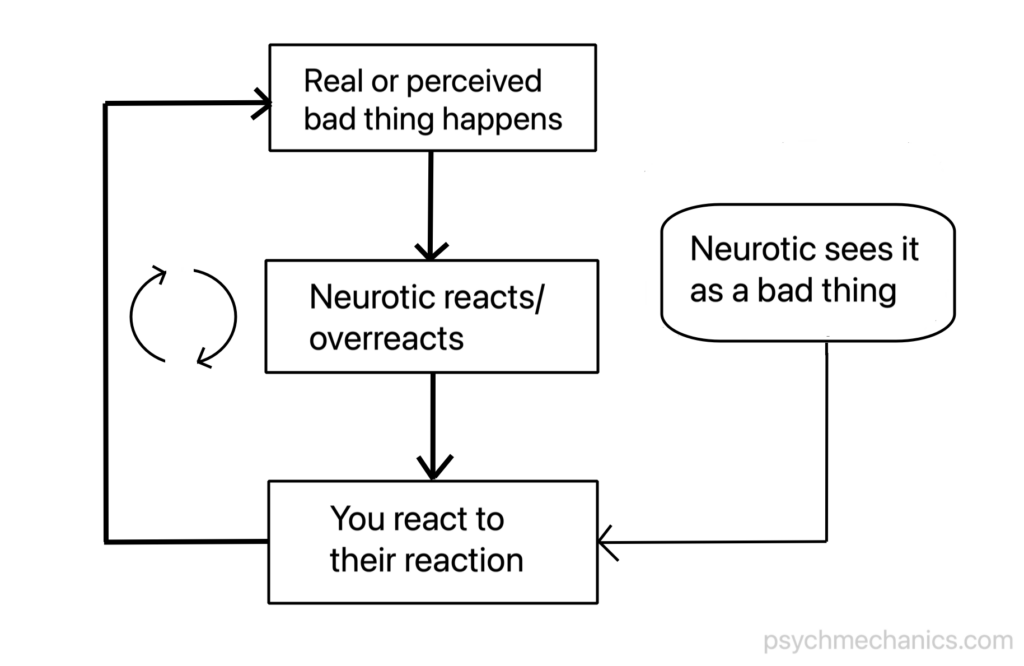Neuroticism is one of the dimensions of the Big Five personality assessment, one of psychology’s most reliable personality assessments. The meaning of ‘being neurotic’ has evolved. In simple terms, it means to be emotionally unstable. A neurotic person has a greater tendency to experience ‘negative’ emotions like:
- Anger
- Anxiety
- Fear
- Guilt
- Depression
They’re prone to getting stressed and, when stressed, cannot handle their negative emotions. They tend to get overwhelmed by their negative emotions and dump them on those around them.1Vollrath, M., Torgersen, S., & Alnæs, R. (1995). Personality as long-term predictor of coping. Personality and individual differences, 18(1), 117-125. They always seem to be in some kind of misery or problem.
The upside of neuroticism is that they can easily detect threats that others might miss. The downside of this hypervigilance is seeing threats where there are none.2Gunthert, K. C., Cohen, L. H., & Armeli, S. (1999). The role of neuroticism in daily stress and coping. Journal of personality and social psychology, 77(5), 1087.
Effects of neuroticism
Since emotions are contagious, people who are close to the neurotic person tend to pick up their negative feelings. They get burdened with negative emotions and problems that are not even their own. As a result, it can be exhausting to deal with a neurotic person. They tend to bring out the worst in you. You might be a calm sage with other people, but with a neurotic person, you become emotionally unstable. You find yourself getting worked up, reacting angrily, and yelling. This negatively impacts the quality of your relationship with the neurotic person.3Esplin, C. R., Rasmussen, B. D., Hatch, S. G., Hawkins, A. J., & Braithwaite, S. R. (2024). Neuroticism and relationship quality: A meta-analytic review. Journal of Personality and Social Psychology.
People who are close to neurotic people often get caught in a vicious cycle. First, the neurotic person gets stressed because they witness a threat. The threat might be real or perceived. Then, they react negatively to that threat. Seeing their reaction/overreaction, the person close to them gets upset or criticizes this reaction/overreaction.
The neurotic person, already stressed, sees their loved one reacting angrily to their reaction as another threat to which they need to react. The negative reactions pile upon each other, and the situation escalates. To the outside observer, both seem neurotic and out of control.

Dealing with a neurotic person
1. Understand neuroticism
If you’re generally calm, you likely expect others to be calm. A big part of learning how to deal with neurotic people is understanding and accepting that they’re different than you. They are the way they are due to their genetics and environmental influences. Expecting them to behave like you is a mistake, and you’ll only get disappointed. You were not put on earth to fix them. That’s their responsibility.
2. Practice calmness
I know it’s easy to lose your calm when you’re with a neurotic person. But try to see it as a challenge- a game. When the neurotic person tries to get on your nerves, practice emotional self-regulation. Avoid getting worked up and lashing out at them. This will significantly improve your emotional self-regulation.
Emotional self-regulation is a critical skill to master. It’ll spill over to other areas of your life and make you a better person overall. You’ll react less in knee-jerky ways to what life throws at you. Having a neurotic person in your life is an excellent opportunity to master your emotions. You’ll become more aware of your own emotions. It’ll infuse your life with more intentionality and rationality.
When you’re calm, you also break the vicious cycle of neuroticism. When the neurotic person in your life loses it, you avoid feeding their neuroticism and becoming a neurotic person yourself. Hold on tight to calmness, rationality, and intentionality.
3. Pick your battles
When I ask you to understand a neurotic person and be calm, I’m not asking you to ignore your own needs and boundaries. At least half the time, a neurotic person will behave neurotically without any reason. If you let go of these minor disturbances in your peace and calm, you’ll be better off in the long run. Do not take every sentence and reaction of a neurotic person seriously. Calmly and logically guide them to objectivity.
If they violate your boundaries, that’s when you confront them, but assertively. Because your emotion feeds their emotion, you have to keep emotion out of the equation. You have to prioritize facts and reason. When a neurotic person is firmly under the grip of their emotions, it’s challenging to make them see the light. That’s why it’s essential to nip the evil in the bud. You must bring rationality into the equation as soon as they start acting neurotically. Later, it might be too late.
4. Avoid arguments
There’s no such thing as a discussion with a neurotic person. They’ll lure you into a ‘discussion’, and soon you’ll find yourself caught in pointless arguing, going nowhere. Neurotic people probably get some weird satisfaction by dragging people down with them. Don’t take the bait. You must understand that their discussions aim not to uncover the truth but to express their negative emotions.
I’m not saying you should stop discussing things with a neurotic person. Instead, you should answer in a way that prevents them from dumping their emotions onto you. For instance, you could reply with one-liners or short, unemotional sentences.
As soon as the interaction becomes like a ping-pong, you quit and withdraw from the conversation. Emotions have taken over. Don’t get dragged into the mud. Let them win. You can engage in endless, pointless arguments with them if you want. In the end, you might even win. But at what cost? Your mental health.
5. Avoid criticizing and blaming
Neurotic people are already highly self-critical. So, when you throw criticism at them, it adds fuel to the fire. You could say the same thing to an emotionally stable person, and they’d be able to take it. However, a neurotic person sees ‘criticism and blaming’ as another threat to which they must react negatively. Instead, focus on what’s good in them. If you address issues with them when they’re in a good mood, you’re more likely to get a positive response.
When dealing with neurotic people, bluntness and straightforwardness doesn’t work. They’ll resent you for it. Instead, if you care about them, try to foster a loving and healthy relationship with them and watch their neuroticism decrease. Simple gestures of affection, such as hugging, can go a long way in stabilizing a neurotic individual.

